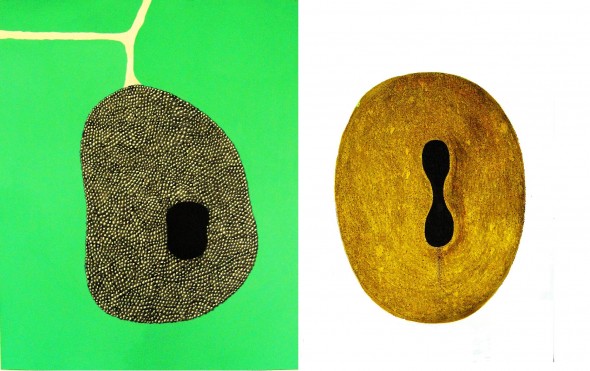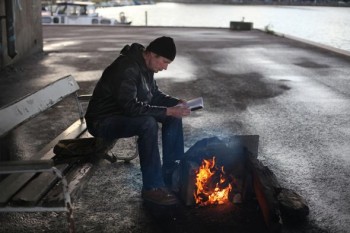Search results for "jarkko/2011/04/2010/10/mikko-rimminen-nenapaiva-nose-day"
Des res
Extracts from the novel Juoksuhaudantie (‘The Trench Road’, WSOY, 2002)
Matti Virtanen
I belonged to that small group of men who were the first in this country to dedicate themselves to the home front and to women’s emancipation. I feel I can say this without boasting and without causing any bickering between the sexes.
A home veteran looks after all the housework and understands women. Throughout our marriage I have done everything that our fathers did not. I did the laundry, cooked the food, cleaned the flat, I gave her time to herself and protected the family from society. For hours on end I listened to her work problems, her emotional ups and downs and her hopes for more varied displays of affection. I implemented comprehensive strategies to free her from the cooker. I was always ready with provisions when she got home exhausted after a day at work. More…
The son of the chimera
30 September 1999 | Fiction, Prose
A short story from Pereat mundus. Romaani, eräänlainen (‘Pereat mundus. A novel, sort of’, WSOY, 1998)
I was born, but not because anyone wanted it to happen. No one even knew it was possible, for my mother was a human being, my father a chimera. He was one of the first multi-species hybrids.
Only one picture of my father survives. It is not a photograph, but a water-colour, painted by my mother. My father is sitting in an armchair, book in hand, one cloven hoof placed delicately on top of the other. According to my mother, he liked to leaf through illustrated books, although he never learned to read. He is wearing an elegant, muted blue suit jacket, but no trousers at all. Thick grey fur covers his strong legs, right down to his hoofs. Small horns curve gracefully over his convex forehead. Striking in his face are his round, yellow eyes, his extraordinarily wide mouth, his tiny chin and his surprisingly large but flat nose. More…
In other words
21 June 2012 | This 'n' that
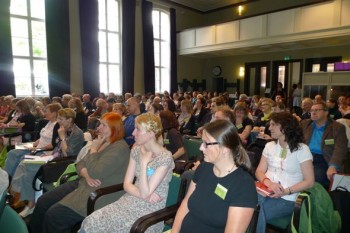
Wordworkers meet: the translators' congress in Helsinki, 11–14 June. Photo: Hannele Jyrkkä
From Finnish or Swedish into 32 languages: in mid June FILI (the Finnish Literature Exchange) held the biggest international meeting of translators of Finnish literature of all time.
The congress, entitled Kääntäjän sana/Översättarens ord (Translator’s word) was planned with one eye on the Finnish theme of the 2014 Frankfurt Book Fair.
The former Lisa Hagman School, now the House of Learning, offered the premises for workshops and lectures for 120 professional translators and almost 70 scholars of language and literature.
Participants translating from both Finnish and Finland-Swedish were offered opportunities to meet writers, listen to lectures from experts in language and literature and gain feedback from other active professional readers. More…
The Canada goose
31 December 2008 | Archives online, Fiction, Prose
A short story from Tapaus Sidoroff (‘The Sidoroff case’, WSOY, 2008). Introduction by Kristina Carlson
It was no use even trying the old cart track branching from the main road. I turned off the engine and glanced into the back seat. My aunt lifted the brim of her hat, her bright eyes peering at me questioningly.
‘We can’t get any farther by car. The road’s nothing but rough brush. What do you think, Aunt Alli, can you walk the rest of the way?’
My aunt shook her head and didn’t even bother to answer. She opened the car door and clambered out. A swarm of black flies wafted into the air from the brush at the bottom of the ditch.
‘For heaven’s sakes, there’s sure enough of these flies.’
She fanned at the air with her hat, straightened the hem of her dress and trudged across the ditch, without looking back, through the thicket of willows. In spite of her hip trouble, the old woman made her way in such a hurry that I had my work cut out keeping up with her. More…
Losing it
31 March 2002 | Archives online, Fiction, Prose
An extract from the novel Jalat edellä (‘Feet first’, Otava 2001). Introduction by Kanerva Eskola
Once he had sat in the car for a while Risto could feel his thoughts slowly becoming clearer. Tero had been killed by a lorry. He couldn’t think particularly actively about it but perhaps he could have said it out loud. After all, people often say all kinds of things that they don’t think. Maybe even too often, he wondered and decided to have a go.
‘Tero is dead,’ he said and the words tasted of preserved cherries.
In the changing room at the swimming pool Risto noticed that his swimming trunks and towel were mouldy. He had forgotten to hang them up to dry after the last time he went swimming. That was a thousand years ago and now a bluish grey fur was growing on them. He examined the bitter smelling mould on his trunks; the fur was beautiful, smooth and silky like a rabbit’s coat. He gently stroked his trunks. I can use these for ice swimming, he decided, and began to chuckle quietly to himself.
Green thoughts
Extracts from the novel Kuperat ja koverat (‘Convex and concave’, Otava, 2010)
I decided to go to the Museum of Fine Arts.
After paying for my entrance ticket, I climbed the wide staircase to the first floor. There all I saw were dull paintings, the same heroic seed-sowers and floor-sanders as everywhere else. Why were so many art museums nothing more than collections of frames? Always national heroes making their horses dance, mud-coloured grumblers and overblown historical scenes. There was not a single museum in which a grandfather would not be sitting on a wobbly stool peering over his broken spectacles, interrogating a young man about to set off on his travels, cheeks burning with enthusiasm, behind them the entire village, complete with ear trumpets and balls of wool. The painting’s eternal title would be ‘Interrogation’ and it would be covered with shiny varnish, so that in the end all you would be able to see would be your own face.
I climbed up to the next floor. All I really felt was a pressing need to run away. No Flemish conversation piece acquired in the Habsburg era was able to erase a growing anxiety related to love. More…
Egg in a Cage?
17 August 2012 | This 'n' that

Noises off: the Chapel of Silence. Photo: Mika Huisman/Decopic
A windowless wooden construction with a timber interior sits on a busy route between the bus and railway stations in the middle of Helsinki. The egg-shaped Chapel of Silence contains simple wooden benches, offering a moment of peace and quiet for anyone passing by.
Almost 12 metres high, 270 square metres in overall footprint, it is a sacral space, with a small cross and an altar at the back, but it is not intended for liturgical purposes – however, social services are available for private conversation during opening hours.
Helsinki is this year’s World Design Capital – together with the neighbouring cities of Espoo, Vantaa, and Kauniainen, and Lahti, a hundred kilometres to the north. Every second year the International Council of Societies of Industrial Design recognises one global city `for its accomplishments in utilizing design as a tool to improve social, cultural, and economic life’. More…
Tutti frutti
20 November 2009 | In the news
 The chair of the jury for the Finlandia Prize for Non-Fiction 2009, Professor Pekka Puska, compared choosing a winner to the dilemma of choosing between oranges and bananas. The jury found that among the entries were at least 20 or 30 books that could have gone on the final shortlist of six titles. More…
The chair of the jury for the Finlandia Prize for Non-Fiction 2009, Professor Pekka Puska, compared choosing a winner to the dilemma of choosing between oranges and bananas. The jury found that among the entries were at least 20 or 30 books that could have gone on the final shortlist of six titles. More…
Anu-Hanna Anttila & al.: Kuriton kansa [Unruly nation]
13 August 2010 | Mini reviews, Reviews
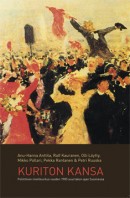 Anu-Hanna Anttila & Ralf Kauranen & Olli Löytty & Pollari Mikko Rantanen Pekka & Petri Ruuska
Anu-Hanna Anttila & Ralf Kauranen & Olli Löytty & Pollari Mikko Rantanen Pekka & Petri Ruuska
Kuriton kansa. Poliittinen mielikuvitus vuoden 1905 suurlakon ajan Suomessa
[Unruly nation. The political imagination of the 1905 general strike in Finland]
Tampere: Vastapaino, 2009. 317 p., ill.
ISBN 978-951-768-246-6
€ 33, paperback
In the beginning of the 20th century the Grand Duchy of Finland, a part of the Russian Empire, entered a period of crisis and began to turn into a nation with its own institutions. Universal and equal suffrage increased tenfold the number of those eligible to vote. A move to the granting of political rights was demanded during the 1905 general strike, which was both an internal political power struggle and a demonstration by Finns against the Russification measures being imposed by their rulers. The book examines the ideological currents of the strike period and investigates their definitions of ‘nation’ and ‘nationality’, with reference to literary research, historical sociology, cultural studies and women’s studies, making extensive use of contemporary documents. The book’s essays portray the spectrum of ideas, reflected in groups like the theosophists, Tolstoyans and anarchists.
Slowly does it
5 November 2009 | Reviews

Straight from the oven: cabbage rolls. – Photo: Sami Repo
Mummola
[Grandma’s house]
(food: Hans Välimäki, photographs: Sami Repo, text: Mikko Takala, graphic design: Timo Numminen)
Helsinki: Otava, 2009. 224 p., ill.
ISBN 978-951-1-23930-7
€ 40
How paradoxical: in the past couple of decades, numerous internationally famous gourmet restaurants have sprung up in Finland, and at the same time it’s harder than ever to find ordinary, well-prepared ingredients for cooking at home.
It’s hard to get used to the fact that foods like beef and lamb kidneys, sweetbread, and cheaper cuts for use in stews and soups have made way for cheap Brazilian steaks on special offer, even at the largest stores’ meat counters. There’s no point in looking for whole chickens (and certainly not organic poultry), let alone whole, locally caught fish. The last time I asked at the fish counter of my local market if they might have any salmon heads and bones for chowder, the seller looked for a moment like she might summon security. The consumer wasn’t consulted when ‘taste’ and ‘variety’ were replaced by ‘ease’ and ‘speed’. More…
Verse and freedom
16 January 2014 | Articles, Non-fiction
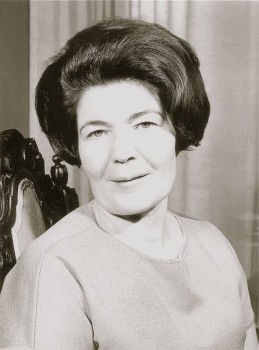
Aale Tynni (1913–1997). Photo: WSOY
Finnish poetic modernism, which with its freedom of rhythm came to dominate the literary mainstream of the 1950s, posed a particular challenge to the poets of the classical metrical and romantic poetic tradition. Aale Tynni (1913–1997) is not a poet of any one school or form, but rhythm is the deepest foundation of her poems, whether expressed in metre, free verse or the speech rhythms that characterise some of her poems of the 1950s and 60s, as well as those of her final years.
An Ingrian Finn, Tynni left Ingermanland near Petersburg for Finland as a refugee after the First World War, in 1919. The war and the period of uncertainty that followed it are present in her poems as an allegory, sometimes appearing as a dance of death or a carnival. At other times they emerge in the myth of Phaethon, who with his sun chariot is in danger of throwing Mother Earth off her axis, or as a game of chess in which God and the angel Gabriel play with the planets and moons as pieces. The poet makes use of mythic and cosmic references to widen her scope and to portray Man in the stages of history and the present age. More…
A slow passion
30 September 2007 | Fiction, Prose
A short story from the collection of short stories Hidas intohimo (‘A slow passion’, Gummerus, 2007)
I don’t want to interfere with it. If something comes of it, then something comes of it. You can’t interfere with time, or fate, or another person. Time ripens things on its own. Fate takes a longer view of things than people do. Like the prophet says, there is a time for every purpose, for my purposes and other people’s.
This garden cottage is a good place to watch everything quietly, a ringside seat for someone who doesn’t want to flail around getting smashed up. The potatoes bloom when it’s time for them to bloom, depending on the length of the summer, the weather, and the time they were planted. Their white and purple flowers are worthy of admiration– potato flowers are flowers, after all. But when the flowers are just opening, it’s not yet time to go digging around among the roots. You have to restrain yourself and wait until the tubers form. You have to wait until they’re finished blooming and the flowers are replaced by plumping green, poisonous berries – though not all potato varieties produce them. But if your fingers are really itching for them, you can poke into the dirt and grope around a little before it’s really time, feel for tubers and remove them carefully, patiently, leaving the plant undisturbed for the smaller ones to grow. If the groping turns up something, you can slip away and savour it, but you still have to wait before you can dig up the whole plant with its rootstock, its beautiful pure tubers heaved up onto the soil, as if Life were offering itself on a silver salver. Then you can have them. They’re ready. But it takes time. Many good things are destroyed by impatience. More…
For the love of a city
31 December 2004 | Archives online, Fiction, Prose
Extracts from the novel I väntan på en jordbävning (‘Waiting for an earthquake’, Söderströms, 2004). Introduction by Petter Lindberg
Nonna Rozenberg lived quite near the special school where I was a boarder, in a block nine stories high with a bas-relief to the right of the door. This bas-relief featured a fairy-tale figure – the Firebird or the Bird Sirin.
I often saw Nonna stepping out of a tram carrying a large brown case. She moved carefully, as if afraid of falling.
She played the cello, and resembled that bulky, melodious instrument herself. Women’s figures are often compared to guitars. But Nonna’s appearance never hinted at parties at home with parents away or singsongs around the camp-fire.
She was no beauty. Her slow, precociously mature body was neither graceful nor girlishly delicate. If I’d met her later, when I was working at a gym, I’d have said she was overweight and lacking in self-discipline. More…
Markus Nummi: Karkkipäivä [Candy day]
26 November 2010 | Mini reviews, Reviews
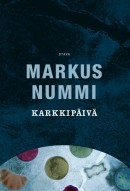 Karkkipäivä
Karkkipäivä
[Candy day]
Helsinki: Otava, 2010. 383 p.
ISBN 978-951-1-24574-2
€28, hardback
Like this one, Markus Nummi’s previous novel, Kiinalainen puutarha (‘Chinese garden’, 2004), set in Asia at the turn of the 20th century, involves a child’s perspective. Karkkipäivä‘s main theme, however, is a portrait of contemporary Finland. Tomi is a little boy whose alcoholic parents are incapable of looking after him; Mirja’s mother is a frantic workaholic heading for a nervous breakdown. She is a control freak who secretly gorges on chocolate at work and beats her little daughter – a grotesque portrait of contemporary womanhood. Tomi manages to get some adult attention and help from a writer; the relation between them gradually builds into one of trust. Katri is a social worker, empathetic but virtually helpless as part of the social services bureaucracy. Virtually every adult suspects others of lying, finding each other’s motives doubtful. Nummi (born 1959) has structured Karkkipäivä with great skill; the ending, in which matters are resolved almost by chance, is particularly gripping. This novel was nominated for the 2010 Finlandia Prize for Fiction.

